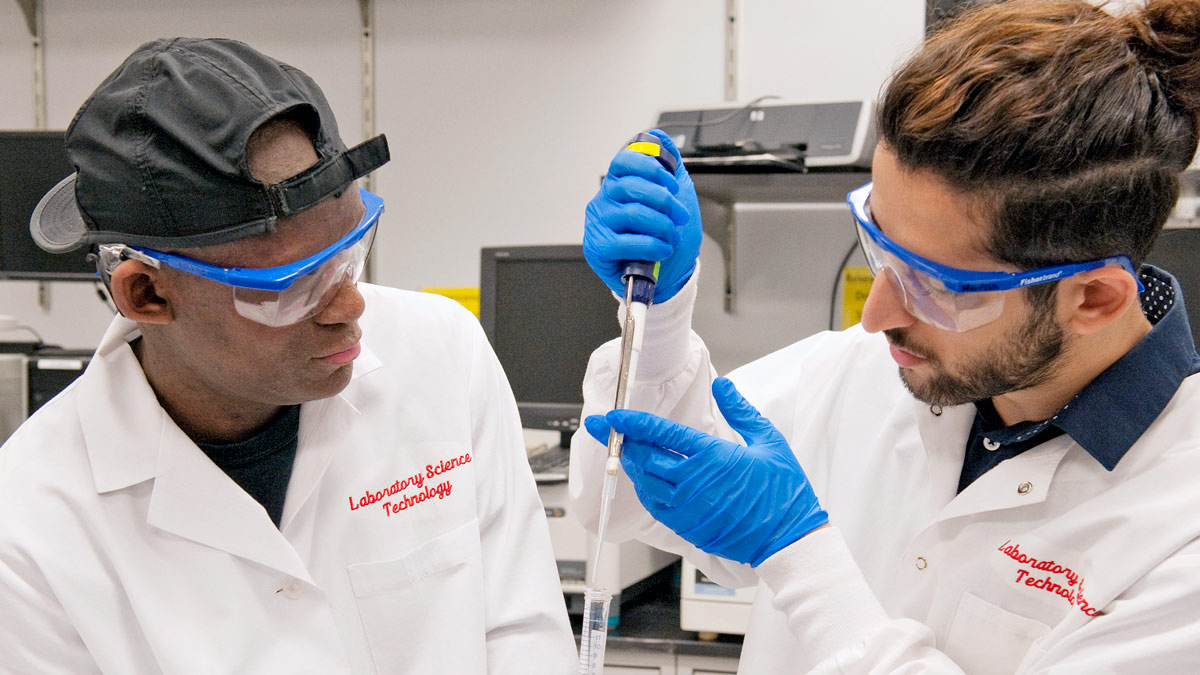Laboratory Science Technology Associate in Occupational Studies Degree

Laboratory Science Technology
Associate in Occupational Studies Degree
- RIT /
- Rochester Institute of Technology /
- Academics /
- Laboratory Science Technology AOS
Explore the science lab of the future with an AOS program in Laboratory Science Technology. Analyze, innovate, excel.
Overview for Laboratory Science Technology AOS
The laboratory science technology program, with its foundation of course sequences in chemistry, biology, and instrumental analysis, was developed primarily from an industry perspective to prepare students for employment as laboratory technicians. The program has several significant factors that set it apart, including the application of real-world analyses and a state-of-the-art instrumentation laboratory. Graduates are prepared to work in a broad range of fields, including chemical, biological, biotechnical, pharmaceutical, environmental, industrial, forensic, and food analysis. This program is available for qualified deaf and hard of hearing students.
If you're interested in doing scientific analysis and lab work in chemical, biological, biotechnical, pharmaceutical, environmental, forensic, food or industrial fields, then the laboratory science technology program is for you. You will study in laboratory settings with experienced faculty and learn to use state-of-the-art laboratory equipment for scientific analysis. Our advanced, high-tech analytical instrumentation is equivalent to that used by scientists on the job. You get hands-on experience using this instrumentation daily.
The associate in occupational studies (AOS) degree in laboratory science technology, offered by RIT's National Technical Institute for the Deaf, is a career-focused degree program that leads to immediate entry into well-paying careers at the paraprofessional or technician level in municipal, public, private and industrial laboratories. Technicians are involved with the collection and preparation of samples and standards. They also perform instrumental, volumetric, gravimetric, and biological analyses. Additional job responsibilities may include the interpretation and reporting of experimental results and data.
-
Apply for Fall 2026
First-year students can apply for Early Decision II by Jan. 1 to get an admissions and financial aid assessment by mid-January.
Careers and Cooperative Education
Typical Job Titles
| Laboratory Technician | Quality Control Specialist | Assistant Research |
| Development Scientist |
Industries
-
Biotech and Life Sciences
-
Chemical
-
Consumer Packaged Goods
-
Environmental Services
-
Food and Beverage
-
Manufacturing
-
Oil and Gas
-
Pharmaceuticals
Cooperative Education
Cooperative education, or co-op for short, is full-time, paid work experience in your field of study. And it sets RIT graduates apart from their competitors. It’s exposure–early and often–to a variety of professional work environments, career paths, and industries. RIT co-op is designed for your success.
Students in the laboratory science technology program are required to complete a cooperative education work experience prior to graduation. You may schedule your co-op after completing your second-year academic requirements.
Curriculum for 2025-2026 for Laboratory Science Technology AOS
Current Students: See Curriculum Requirements
Admissions and Financial Aid
For the career-focused AOS Degree
- 2 years of math required
- 1 year of science required
- English language skills as evidenced by application materials determine associate degree options.
Specific English, Mathematics, and Science Requirements and other Recommendations
- English: Placement into NENG-114 Literacies II or above. To earn the AOS degree, students must complete all necessary NENG coursework through NENG-115 Literacies III or they must place into an English course above NENG-115 Literacies III.
- Mathematics: Placement into Integrated Algebra (NMTH-212) or above. Typically, students entering this major will have completed at least three years of high school mathematics.
- Science: Typically, students entering this major will have completed at least two years of high school science. Completion of high school chemistry is required.
- ACT (optional): The ACT middle 50% composite score is 14-17.
Financial Aid and Scholarships
100% of all incoming first-year and transfer students receive aid.
RIT’s personalized and comprehensive financial aid program includes scholarships, grants, loans, and campus employment programs. When all these are put to work, your actual cost may be much lower than the published estimated cost of attendance.
Learn more about financial aid and scholarships
Accreditation
Contact
- Austin Gehret
- Department Chair
- Department of Science and Mathematics
- National Technical Institute for the Deaf
- 585‑475‑3971
- augnts@rit.edu
Department of Science and Mathematics













